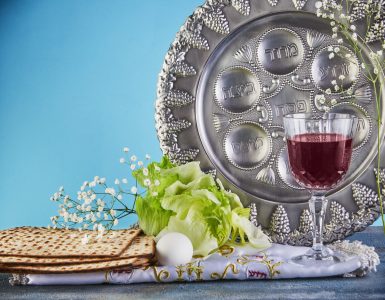A number of questions, raised by medical personnel regarding Shabbos Zachor, Ta’anis Esther, and Purim, were addressed in our Beis Hamedrash. They are delineated below.
- I am a female nurse working a night shift on Shabbos Zachor. Am I obligated to hear the reading of Parshas Zachor?
Answer: There is a Machlokes haPoskim as to whether women are obligated to read Parshas Zachor. According to the Sefer haChinuch, they are exempt because women generally do not go out to war and cannot be obligated to read the passage that reminds us to wage war with Amalek.[1] However, the Minchas Chinuch questions this premise, as do the Binyan Tzion[2] (citing R’ Nasan Adler) and Maharil Diskin.[3] They rule that women are obligated in this Mitzvah.
L’Halacha, Rav Shlomo Zalman Auerbach zt”l ruled that women are exempt meiIkar haDin, however, it is appropriate that they go to hear the reading as a “Hiddur”. This was the instruction Rav Shlomo Zalman gave to his wife.[4] The Sefer Orchos Rabbenu reports that this was also the position of the Steipler zt”l (citing the Chazon Ish); though he held women are essentially exempt, he instructed his daughters to go to hear the reading.[5] The Kovetz Kol Torah (Nisan 5763) quotes Rav Moshe Feinstein zt”l who stated that women are not accustomed to go to hear Parshas Zachor.
Essentially, this matter depends on the local custom. Some communities (particularly in Yerushalayim) are Makpid that women fulfill the Mitzva. Others are not. In regular situations a woman should follow the custom in her community. However, if a woman is sick or weak there is certainly room to be lenient, though she should at least read the passage from a Chumash since some Poskim hold that this fulfills the obligation.
With regard to our question. If the nurse is exhausted from the night shift, she may be lenient and not go to the reading. However, since many communities arrange a reading in the afternoon hours she should try to attend one.
- I am a nurse in a hospital. Fasting gives me a headache and makes me feel weak, impeding me from fulfilling my duties. Am I obligated to fast on Ta’anis Esther?
Answer: Rav Shlomo Zalman Auerbach zt”l ruled that medical personnel are exempt from fasting if their ability to perform their duties will be impaired. Since a Choleh sheEin Bo Sakana is exempt from the fast, those who treat him are similarly exempt if the fast will affect their ability to provide treatment. This is certainly true in the case of those who treat Cholim sheYesh Bahem Sakana.
Clearly, each person should carefully consider whether his ability to perform his duties will be harmed significantly by fasting. For example, a regular family doctor who sees patients in his clinics during the morning is unlikely to be exempt from the fast.
- In my duties as a nurse I sometimes encounter patients who refuse to eat on Ta’anis Esther (or other fasts). They claim that they are able to fast. Since I am religious I think that if I would tell them the Halacha they would listen to me. Please provide a brief summary of the issues and practical guidance.
Answer: We will first discuss the Halachos of Ta’anis Esther (which are different to those of other fasts):
Ta’anis Esther is more lenient than other public fast days. Though it is Minhag Yisrael to observe the fast, and it is an extremely powerful time for Tefila, the lenient approach of Halacha has important ramifications for the sick, the elderly, and pregnant or nursing women. Some of its Halachos are summarized below:
- Pregnant women do not observe this fast (Shulchan Aruch O.C. 554:5). The practice of the Sefardim is that pregnant women only fast on Tisha b’Av and Yom Kippur (Or l’Tzion 25:7). However, the Rema’s view (O.C. 550:1) is that pregnant women customarily fast, unless it would cause them great distress. The Mishna Berura (ibid. 3) clarifies that they should not fast if they are weak in any way. Today, it is commonly held, that since people are generally of weaker constitution, and pregnant women are likely to be distressed by fasting, they should not do so (Halichos Shlomo 16:1 & Chut Shani, Shabbos 4, p261). [Some cite Rav Shmuel Wosner zt”l as ruling that they should begin fasting, but if they feel weak they should discontinue the fast immediately.] Since Ta’anis Esther is the most lenient of the public fast days, the Poskim agree that pregnant women should not fast at all (Piskei Teshuvos, 686, footnote 9).
- According to the Shulchan Aruch (ibid.) nursing women should not fast at all. This is the custom of the Sefardim. However, the Rema’s view is that nursing women customarily fast, unless it would cause them great distress. Contemporary Poskim rule that they should not fast due to the concern that her supply of milk will be affected (Chut Shani, Shabbos 4, p260). The Chut Shani and Or l’Tzion (ibid.) rule that she is exempt from fasting, even if she only nurses a little bit, or just once a day.
- A woman who has given birth is exempt from fasting for 30 days (Shulchan Aruch O.C. 554:6) as she is considered a Cholah She’ein Bah Sakanah (a non-dangerously ill person) who is exempt from these fasts (see below). After 30 days, if she feels weak she may be lenient and not fast (Kaf haChaim 554:28). Some hold that a woman who has given birth is exempt for fasting for 24 months! Their reasoning is that a nursing woman is not exempt due to the nursing but due to the period of recovery following birth. Chaza”l describe childbirth as “jarring a woman’s limbs”, and she does not fully recover for 24 months. The Halacha is not in accordance with this ruling, but each case should be examined independently. If she feels weak during those 24 months, and she wishes to be lenient, there are Poskim to rely upon who permit it (Chazon Ovadia, Ta’aniyos p62).
- If a woman suffers a miscarriage more than 40 days post-conception, she has the same status as a woman who has given birth (Biur Halacha 617:4 & Shemiras Shabbos Kehilchasa 36:5).
- A Choleh She’ein Bo Sakanah is exempt from fasting except on Tisha b’Av and Yom Kippur, as the Chachamim did not make enactments that would adversely impact those who are sick (Shulchan Aruch 554:6). In fact, they may not be stringent and fast (Mishna Berura 550:4).
- Who is considered a Choleh She’ein Bo Sakanah?
- A person whose entire body is painful or who is forced to lie down due to illness (Shulchan Aruch 328:10).
- A temperature above 37.5⁰C degrees is indicative of a medical issue and is grounds to exempt a person from fasting (Or l’Tzion 3, p260). A higher temperature may render a person a Choleh sheYesh Bo Sakanah.
- A person with a headache that causes him to perspire in pain (Or l’Tzion ibid.)
- A person with diabetes who takes insulin or antihyperglycemic medications.
- (Uncontrolled) high blood pressure
- A person with an internal infection such as a throat or kidney infection, or septic arthritis.
- A person with gastroenteritis causing diarrhea or intestinal distress.
- A cardiac patient who will be harmed by fasting.
- Patients with malignant diseases.
- A patient who has undergone a minor surgery, such as the repair of a broken bone, is exempt from fasting for three days following the surgery. If he doesn’t feel well, he is exempt for seven days. If it was a more significant surgery, he is exempt for 30 days, like a woman who gave birth. Each case should be examined individually – if the person feels weak, they are exempt even after 30 days (Or l’Tzion ibid. Teshuva 6).
- Those who feel extremely weak, have pain in their eyes, or a bad headache, are exempt from fasting, particularly on Ta’anis Esther (Poskim in O.C. 550).
- A person over the age of 80 should not fast (Or l’Tzion 3:29). Below that age – if a doctor maintains that fasting will harm him – he is considered a Choleh She’ein Bo Sakanah and is exempt from fasting. If he is healthy and strong, he should fast (Kaf haChaim 550:6). A person should be smart and not harm himself due to the fast, thus losing more than he gains.
- A sick person who has recovered but still feels weak due to the residual effects of the illness is exempt from fasting. For example, a person who had a temperature of higher than 38 degrees for three days, or fever and diarrhea, is exempt from fasting for three days. If he had high fever (a temperature of 39-40 degrees), he was considered a Choleh sheYesh Bo Sakana and is exempt from fasting for seven days (Or l’Tzion ibid.)
- A person who is permitted to eat during the fast should limit their food and drink intake slightly so as not to separate themselves from the Tzibur who are fasting. Unless there is a medical need, they should not eat meat or drink wine (Eshel Avraham 686).
- According to the Da’as Torah, citing the Shu”t Besamim Rosh (239), if a person will be severely weakened due to the fast and will still be in distress over Purim, he is exempt from fasting. This ruling has not been widely accepted and a person should not be lenient without consulting a Rav (Piskei Teshuvos 686).
- I am a trainee in the hospital and often assigned to long shifts. This year, I will be assigned to the Emergency Department from the afternoon on Erev Purim until the following afternoon. I do not see when I will be able to hear the Megilla at night (I will try to find an afternoon reading of the Megilla after my shift concludes). Am I obligated to hear the Megilla at night?
Answer: Generally speaking, members of the medical team attempt to proactively schedule their hours to allow them to fulfill time-bound Mitzvos, either before or after their shifts or during those hours, if possible. However, the Halacha is that medical professionals and nursing staff who are engaged in patient care that would be diminished if they took off an hour to listen to the Megilla are exempt from the Mitzva. As a rule, one should attempt to fulfill the Mitzvos haYom, but if someone was unable to hear the Megilla before beginning his shift and sees in the course of his duties that he will not have the opportunity to perform the Mitzva without being derelict in his responsibilities, he is exempt from the Mitzva.[6]
- I will be eating the Purim Seuda during my shift in the hospital. How should I fulfill the custom of drinking wine?
Answer: A doctor who is not engaged in Pikuach Nefesh may drink less than a Revi’is of wine, but a doctor who is actively engaged in saving lives or may be called to duty is forbidden to drink even a tiny amount of wine.
[1] Mitzvah 603.
[2] haChadashos, 8.
[3] Shu”t Maharil Diskin, Kuntres Acharon 102.
[4] Halichos Shlomo, Moadim 18.
[5] Orchos Rabbenu 3, p33.
[6] This is an application of the principle that one who is “Osek b’Mitvza Patur Min haMitzva”. The medical professionals are engaged in the great Mitzvos of saving lives and healing the ill. This is found many times in the Poskim with regard to other Mitzvos of the day.















Add comment